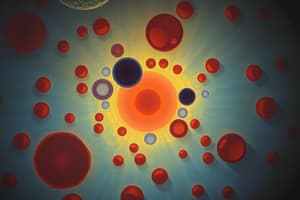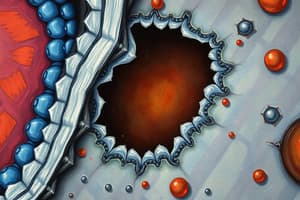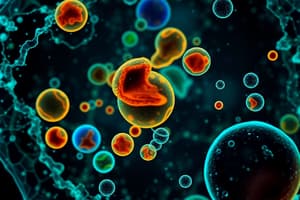Podcast
Questions and Answers
The cell wall provides support and structure to the plant cell and is basically a thick and rigid ______.
The cell wall provides support and structure to the plant cell and is basically a thick and rigid ______.
layer
The best feature of the mitochondria is its energy producing ______.
The best feature of the mitochondria is its energy producing ______.
ability
The cytoskeleton plays multiple roles, including movement, contraction, and maintaining cell ______.
The cytoskeleton plays multiple roles, including movement, contraction, and maintaining cell ______.
shape
The Golgi body serves as a primary packaging area for molecules that will be ______ throughout the cell.
The Golgi body serves as a primary packaging area for molecules that will be ______ throughout the cell.
Lysosomes break down organelles that are no longer ______.
Lysosomes break down organelles that are no longer ______.
The organelle that is responsible for producing lipids is the ______.
The organelle that is responsible for producing lipids is the ______.
A unique feature of a vacuole is that it serves as storage for ______ in a cell.
A unique feature of a vacuole is that it serves as storage for ______ in a cell.
The cytoplasm contains all the organelles necessary for ______ and maintaining life.
The cytoplasm contains all the organelles necessary for ______ and maintaining life.
The cell membrane is often described as a ______ membrane.
The cell membrane is often described as a ______ membrane.
The primary function of the cell membrane is to facilitate the movement of ______ inside and outside the cell.
The primary function of the cell membrane is to facilitate the movement of ______ inside and outside the cell.
The ______ is considered the 'control center' of the cell because it contains DNA.
The ______ is considered the 'control center' of the cell because it contains DNA.
In both plant and animal cells, the nucleus contains the ______ where ribosomes are formed.
In both plant and animal cells, the nucleus contains the ______ where ribosomes are formed.
The cytoplasm is a ______ fluid where organelles are embedded.
The cytoplasm is a ______ fluid where organelles are embedded.
The principal parts of a cell include the cell membrane, cytoplasm, and ______.
The principal parts of a cell include the cell membrane, cytoplasm, and ______.
The cell membrane plays a crucial role in maintaining the ______ of the cell.
The cell membrane plays a crucial role in maintaining the ______ of the cell.
The cell membrane's structure allows for the selective ______ of substances.
The cell membrane's structure allows for the selective ______ of substances.
The Mitochondria are called the 'powerhouses' of cells because they produce much of the energy a plant or animal cell needs to carry out its ______.
The Mitochondria are called the 'powerhouses' of cells because they produce much of the energy a plant or animal cell needs to carry out its ______.
The endoplasmic reticulum (ER) transports ______ from one part of the cell to another.
The endoplasmic reticulum (ER) transports ______ from one part of the cell to another.
Rough ER contains ______ and releases newly made protein from the cell.
Rough ER contains ______ and releases newly made protein from the cell.
Ribosomes are known as the ______ factories of the cell.
Ribosomes are known as the ______ factories of the cell.
Lysosomes contain hydrolytic ______ that can break things down.
Lysosomes contain hydrolytic ______ that can break things down.
The cytoskeleton provides ______ to the cell and gives it its shape.
The cytoskeleton provides ______ to the cell and gives it its shape.
Microtubules are absent in plant cells, and they provide ______ for certain cellular molecules.
Microtubules are absent in plant cells, and they provide ______ for certain cellular molecules.
Plastids are double membrane-bound organelles that serve as the storage for plant cell ______.
Plastids are double membrane-bound organelles that serve as the storage for plant cell ______.
Flashcards are hidden until you start studying
Study Notes
Cell Structure and Function
- Cells are surrounded by a cell membrane, a semi-permeable barrier regulating molecular movement.
- The nucleus is the control center containing DNA, with the nucleolus producing ribosomes in both plant and animal cells.
- Cytoplasm is a viscous, jelly-like substance where organelles are suspended.
Major Organelles
- Mitochondria are the powerhouses of the cell, producing energy required for cellular functions.
- Endoplasmic Reticulum (ER) is a network of tunnels aiding in protein transport.
- Rough ER has ribosomes, synthesizing and exporting proteins.
- Smooth ER lacks ribosomes, primarily synthesizing lipids.
- Ribosomes, the protein factories, synthesize proteins from amino acids.
- Golgi Bodies package proteins and other compounds received from the ER for distribution.
Specialized Organelles
- Lysosomes contain hydrolytic enzymes that digest cellular waste and break down non-functional organelles.
- The cytoskeleton consists of protein fibers providing structural support and shape to the cell, with three components:
- Microtubules, absent in plant cells, create pathways for cellular molecules.
- Intermediate filaments, found in durable structures like hair and nails, provide strength.
- Microfilaments aid in cell movement and shape maintenance.
Plant Cell Features
- The cell wall, made of cellulose, offers rigidity and maintains the box-like shape of plant cells.
- Plastids are double-membrane organelles storing pigments in plants.
- Vacuoles generally store nutrients and waste products, often larger in plant cells than in animal cells.
Important Concepts in Cell Biology
- Organelles function collaboratively to maintain cell health and activity.
- Both plant and animal cells share similar but distinct components.
- The structure of each organelle is closely linked to its specific function within the cell.
Analogies for Understanding Organelles
- Lysosome: digestive system of the cell
- Nucleus: control center
- Mitochondria: energy-processing unit
- Nucleolus: ribosome factory
- Cell wall: protective barrier in plant cells
- Animal cell: lacks cell wall but has flexible shape
Practical Applications
- Engage in hands-on activities, such as building models of animal or plant cells using recycled materials to understand organelle structure and function better.
Studying That Suits You
Use AI to generate personalized quizzes and flashcards to suit your learning preferences.





